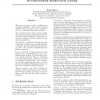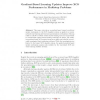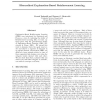168 search results - page 6 / 34 » Optimism in Reinforcement Learning Based on Kullback-Leibler... |
109
click to vote
WSC
2007
14 years 11 months ago
2007
Adaptive Time Warp protocols in the literature are usually based on a pre-defined analytic model of the system, expressed as a closed form function that maps system state to cont...
ICML
1996
IEEE
15 years 1 months ago
1996
IEEE
This paper presents a direct reinforcement learning algorithm, called Finite-Element Reinforcement Learning, in the continuous case, i.e. continuous state-space and time. The eval...
ECML
2005
Springer
15 years 3 months ago
2005
Springer
Active selection of good training examples is an important approach to reducing data-collection costs in machine learning; however, most existing methods focus on maximizing classi...
GECCO
2004
Springer
15 years 2 months ago
2004
Springer
This paper introduces a gradient-based reward prediction update mechanism to the XCS classifier system as applied in neuralnetwork type learning and function approximation mechani...
ICML
1997
IEEE
15 years 10 months ago
1997
IEEE
Explanation-Based Reinforcement Learning (EBRL) was introduced by Dietterich and Flann as a way of combining the ability of Reinforcement Learning (RL) to learn optimal plans with...



